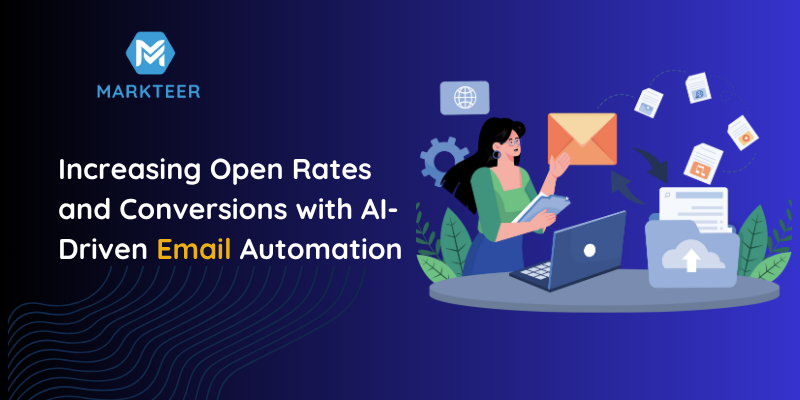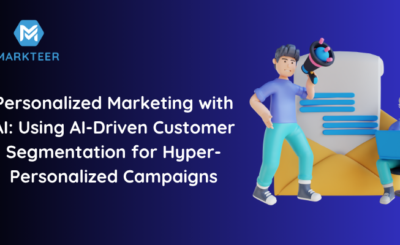In an era when users receive over 347 billion emails daily, email marketing needs more than catchy subject lines and fancy graphics. To truly stand out in cluttered inboxes, brands are adopting AI-powered email marketing—a brilliant, data-driven strategy that leverages artificial intelligence to automate, personalize, and optimize email campaigns.
By utilizing AI, marketers streamline workflows and improve open rates, click-throughs, and overall conversions. With machine learning, behavioral analytics, and generative AI, brands now create highly relevant messages that resonate with users on a deeper level.
What Is AI Email Marketing and How Does It Work?
AI email marketing integrates artificial intelligence tools such as natural language processing (NLP), machine learning (ML), and predictive analytics into every stage of the email journey.
At the heart of this technology is data. AI continuously analyzes user behaviors—clicks, purchases, reading time, and device usage—to tailor messages accordingly. For instance, if a user frequently clicks on fashion-related links, the AI system can prioritize those topics in future emails. According to Salesforce’s State of Marketing Report, 78% of marketers using AI say it helps them deliver more personalized content at scale.
Here is how it typically works:
- Behavior Tracking: AI monitors past behaviors like open rates, purchases, or time on site.
- Segmentation: Users are grouped dynamically based on predictive data.
- Content Generation: Tools like ChatGPT or Jasper help write personalized email copy using tone and keyword preferences.
- Timing Optimization: AI chooses the best time to send the email to each recipient.
Why Is AI Important in Improving Email Open Rates?
AI’s biggest strength lies in email open rate optimization. Traditional batch-and-blast emails often go unopened, but AI allows marketers to fine-tune every component for relevance.
1. Subject Line Optimization
Using natural language algorithms, tools like Phrasee test multiple subject line versions and predict which resonates best. Clients using Phrasee have seen open rates increase by up to 20%, all thanks to AI-generated emotional language and tone matching.
2. Send-Time Optimization
AI does not just guess when to send—it knows. By studying individual user behavior, platforms like Seventh Sense determine when each subscriber is most likely to check their email. This technique has boosted open rates by more than 30% in some campaigns.
3. Hyper-Personalization
AI enables one-on-one personalization instead of mass emails. According to McKinsey, personalized email campaigns powered by AI result in a 5–8x increase in ROI compared to traditional approaches.
Examples of AI-Powered Email Campaigns
Leading companies are leveraging AI to deliver highly personalized, engaging content:
- Netflix uses AI to recommend shows via email based on viewing habits, which has significantly increased engagement time on the platform.
- Spotify sends out personalized playlists and listening reports using behavioral and preference data.
- Amazon employs predictive AI for abandoned cart emails, often converting 10–15% of otherwise lost sales.
- Airbnb tailors its travel recommendations and price alerts to user interests and search history.
A study by DMA UK revealed that emails personalized with AI tools have transaction rates six times higher than non-personalized emails.
AI Email Marketing Tools in 2025
As AI becomes more integrated into martech stacks, several platforms have emerged as front-runners:
- Mailchimp AI: Uses predictive insights for send-time and content personalization.
- ActiveCampaign: Offers AI-powered customer journeys, dynamic email blocks, and behavioral automation.
- HubSpot AI: Enables intelligent workflows based on AI scoring and user engagement.
- Persado focuses on emotional AI to write persuasive, human-sounding subject lines.
- Rasa.io: Automatically curates and delivers personalized email newsletters.
Key Metrics to Track in AI Email Campaigns
AI does not just automate email; it enhances every email marketing KPI by making real-time data-driven decisions.
Metrics Improved with AI:
- Open Rates: AI subject line generation and send-time prediction boost visibility.
- Click-Through Rates (CTR): Hyper-relevant product recommendations drive more clicks.
- Conversions: AI ensures emails hit the right time with the right offer.
- Bounce Rates: Email list cleansing by AI removes invalid contacts pre-send.
- Engagement Score: AI scores each user to track interest levels, refining future campaigns.
Limitations and Challenges of AI Email Automation
While AI offers impressive benefits, marketers must navigate several challenges:
- Data Privacy Concerns: AI requires large volumes of user data, which raises compliance issues under laws like GDPR and CCPA.
- Algorithm Bias: Poorly trained models may misinterpret user preferences or reinforce stereotypes.
- Over-Automation: Too much automation can make emails feel robotic. Striking a balance is crucial.
- Tool Accessibility: Advanced AI platforms can be costly and require technical onboarding.
A PwC report shows that although 76% of CMOs believe AI will change marketing, 47% still feel underprepared to implement it correctly.
Future Trends in AI Email Marketing
AI email marketing is evolving fast. By 2025, we are seeing clear trends that will redefine the industry:
- Generative AI like GPT-4 is being used to create dynamic, emotionally resonant content in seconds.
- Real-Time Personalization: Emails adapt based on user behavior right up to the moment they are opened.
- Emotion Detection: Tools analyze past interactions to shape tone and emotional appeal.
- AI-Driven A/B Testing: Campaigns are tested in real-time, with AI auto-selecting the best-performing content.
Also Read: Why Email Marketing is Necessary for Freelancers
Frequently Asked Questions (FAQs)
What is AI-powered email marketing?
AI-powered email marketing uses artificial intelligence to automate and personalize email campaigns for better results.
How does AI help improve email open rates?
AI optimizes send times, personalizes subject lines, and targets the right audience to boost open rates.
Can AI personalize emails better than traditional methods?
Yes, AI analyzes user behavior to deliver highly personalized and relevant email content.
What is AI-driven email automation?
It’s the use of AI to automatically send emails based on user actions and behavior.
What is B2B lead generation at Markteer?
It’s the process of identifying and engaging high-quality business leads.
What does the lead nurturing service include?
Automated email campaigns to warm up leads until they’re sales-ready.
What is email marketing at Markteer?
Sending targeted promotional emails to grow engagement and conversions.
What email services are offered?
Campaign planning, design, automation, and CRM/ESP integration.
Conclusion
AI-powered email marketing is more than a trend—it is the future of customer engagement. With tools that enhance personalization, optimize delivery, and generate compelling content, businesses are seeing dramatic improvements in open rates, click-throughs, and conversions.
By integrating AI tools like email automation with predictive intelligence, marketers are not just working smarter—they are building deeper, more profitable customer relationships. As 2025 unfolds, those who invest in generative AI in email marketing and stay ahead of emerging trends will dominate the inbox—and the bottom line.
“Still stuck with low open rates and poor conversions? Markteer’s AI-powered email automation takes the guesswork out—so every campaign hits its mark.”





